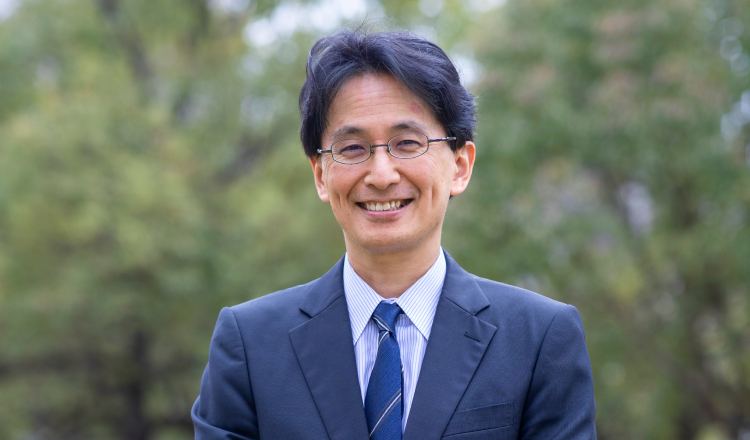
The SDGs are a set of worldwide shared goals for a sustainable and better society that “Leaves No One Behind.”
The COVID-19 pandemic made it abundantly clear that we––all humanity––are in need of help. Yet this insight is not unique to COVID-19; it applies equally to all other societal issues, from natural disasters and climate change through to water scarcity and conflicts.
By changing the perspective, however, we can also approach these various social challenges as opportunities to reconsider things we had previously taken for granted and to clarify what needs to be changed as we enter this new era. Under these circumstances, the SDGs that pledge to “leave no one behind” are becoming increasingly important.
With the motto “Live Locally, Grow Globally,” we have consistently pursued our educational and research activities in accordance with The University of Osaka Charter, which states that we will contribute to social stability and welfare, world peace, and harmony between humans and the natural environment. Especially now, as a world-leading innovative university striving to create a society that fosters a sense of purpose in life, we are working to develop the OU (The University of Osaka) ecosystem that embodies systematic co-creation with society. Using our education and research’s core principle of focusing on the value of life, our efforts to seek solutions for societal issues are centered around the areas of protecting, nurturing, and bonding life.
The principles of the SDGs are fundamental to our activities. Therefore, we consider the SDGs to be both an important roadmap for envisioning the future of humanity and a global platform for collaboration with various stakeholders in society. We can confidently contribute to achieving the SDGs by actively expanding our activities. Thus, we have established The University of Osaka SDGs Committee as a cross-sectional organization as well as its Planning Working Group, thereby enhancing our concerted efforts toward the SDGs.
Specifically, in accordance with the principles of the SDGs, The University of Osaka is endeavoring to become a university of full diversity by promoting even greater diversity and inclusion (D&I) through transcending differences in sexual orientation and gender identity, physical ability, nationality, ethnicity, cultural background, and age. As for education, in addition to the exploration of advanced expertise, we will promote the development of talented individuals who can contribute to the resolution of various societal issues as represented by the SDGs, through the OU-SDGs Program and other means. On the research front, we aim to contribute to achieving the SDGs in various fields by engaging in activities such as reducing greenhouse gas emissions, conducting research on new energy sources, and promoting research on green recovery in collaboration with overseas organizations. The SDGs also guide our plans for campus development as evidenced by efforts such as creating a carbon-neutral environment and establishing two globally minded facilities: OU Global Campus (Minoh City), which fosters diversity that transcends cultural, linguistic, and gender barriers; and Global Village Tsukumodai (Suita City), where domestic and international students, international researchers, and faculty members can live and interact.
In addition to participating in the Kansai SDGs Platform ever since its establishment, comprised of private companies, civil society organizations, universities, and local governments in the Kansai region, The University of Osaka, as one of the incorporators, has recently established the University Subcommittee within this platform. Universities in the Kansai region are playing increasingly central roles in these efforts, and we are working to achieve the SDGs in cooperation with corporations, NPOs, and local governments.
The 2025 World Exposition in Osaka, Kansai, Japan, which will be held under the theme of “Designing Future Society for Our Lives,” also calls for achieving the SDGs. Seizing the opportunity presented by the Expo, we––together with the Kansai Economic Federation, the Kansai Association of Corporate Executives, and the Osaka Chamber of Commerce and Industry––have launched the Inochi Forum, with the aim of achieving a “world where all lives shine” by 2050. Our efforts to ensure that no one is left behind will require us to engage, sympathize, and overcome challenges together with those being left behind. Guided by our commitment to focusing on the value of life in education and research, we have established The University of Osaka Expo 2025 Committee through which we continue to actively contribute to achieving the SDGs, with a particular focus on advancing the efforts of the Inochi Forum.
Through the global platform of the SDGs, The University of Osaka will expand its co-creation network to include diverse contributors including not only industries and local governments, but also economic organizations, international organizations, and citizens going forward. In this co-creation network, we will promote the advancement of science and technology and academia, develop talented individuals who will lead the future, strive for social stability and welfare, world peace, and harmony between humans and the natural environment. In doing so, we will actively contribute to the creation of a society that fosters a sense of purpose in life.
